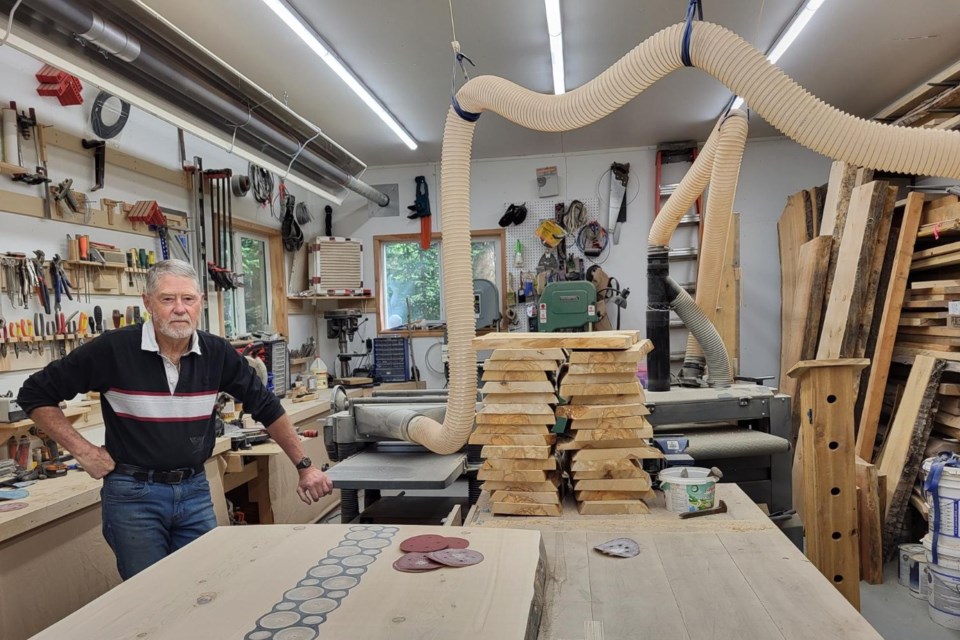Woodworking has always been a part of his life.
His dad had a shop, all five of his brothers have shops, and he’s always had a shop, too.
Dr. Laurie Cook, a retired Prince George family physician, has turned his woodworking skills into a fundraising project for Ukraine’s military efforts against Russia.
He started the project in March 2022 and has contributed more than $40,000 to the cause.
Ulysses, a poem by Alfred, Lord Tennyson, expresses why Cook does what he does.
“Old age hath yet his honour and his toil;
Death closes all: but something ere the end,
Some work of noble note, may yet be done.”
“I like making these things, but then I don’t know what to do with them. They accumulate and get in the way. And why Ukraine? Because the bully is beating up the little kid,” Cook said.
Cook creates dining room tables, coffee tables, benches, bed frames and charcuterie boards.
Some pieces feature inlays, others have live edges, and some are made from whole slabs of local birch and Douglas fir.
Rustically practical, Cook’s pieces are visually striking — but like many artists, he has an overly critical eye when it comes to his own work.
Coffee tables made from Douglas fir sit in his basement.
He used an iron stain that darkened the wood but, to his eye, left an unappealing patchiness that not even two hours of sanding could fix. Despite his misgivings, it’s a beautiful piece.
“With Douglas fir, you never know what the iron stain is going to do — except for one thing that’s consistent — and that is that the sapwood is always lighter than the hardwood,” Cook said.
“And everything is branded 'Slava Ukraini' – For Ukraine.”
Cook is quick to point out that out-of-pocket expenses — like $100 coffee-table legs — are his cost to bear.
“So if this coffee table gets a $750 donation, then all $750 will go to Ukraine,” he said.
To expand his creativity, Cook has started adding inlays to the already beautiful wood pieces, often depicting waterways.
“As most water bodies in this province have gold in them, now some of my pieces have gold in them,” Cook said.
Cook worked as a family physician in Prince George for 35 years and recently retired. He now assists orthopedic surgeons a couple of days a week, he said.
His charcuterie boards are all made with birch.
“I drill holes in all of them because I know a lot of people store them vertically,” Cook said.
There’s a variety of boards in different colours.
“There’s a bit of a story to that,” he said.
“When birch gets big, it tends to rot in the centre. And in the early, early stages of rot, you get some colour. At different stages, you get different patterns.”
Cook logs the wood himself and said birch is a challenge to work with.
He is asking $90 for a charcuterie board, a price some people find high.
“But I’ve got to find the tree, cut it down, take it to my sawmill, cut it up — and then I have to spend a year drying it. Birch has some bad habits. As it’s drying, it tends to twist, cup, split and do all kinds of other things, so there’s a certain amount of waste,” Cook said.
He is currently working on a dining room table that has undergone preliminary sanding, and he plans to try something new with this piece.
“For the first time, I will be using a kind of oil-wax called Odie’s Oil instead of epoxy — to see how it turns out,” Cook said, placing an experienced hand on the wood.
Cook’s woodworking roots trace back to his father, George Cook, a general surgeon in Nova Scotia.
“My dad grew up on a small farm, and when he got back from the war, he got into carpentry. Then he decided he was going to apply to vet school — but getting into vet school then, and now, is very difficult. So he was turned down. He said, ‘All right, I’ll go to medical school,’ and they said, ‘Sure,’” Cook laughed.
“It was easier to be a doctor than a vet.”
His father loved land and eventually acquired 900 acres, which he developed into a productive maple syrup operation.
“He had 25,000 trees under tap, so he made and sold maple syrup for probably 30 years as a sideline,” Cook said.
All six sons of George Cook are woodworkers, and each has a piece of equipment from their dad’s shop. Cook got the jointer — a machine he still uses to this day.
“I’m going to guess that jointer is probably 60 years old, if not 70,” Cook said with a smile.
“I put it on a pallet and had it trucked across the country.”
Cook came to Prince George in 1973.
“In Nova Scotia, it’s hard to find a tree that you could make a telephone pole out of, and it’s hard to find a river that you can canoe — except in the spring,” he said of the move across the country.
“So I came out west because I wanted to see where big trees grew and big rivers flowed.”
To contact Cook about his wood projects, email [email protected].


